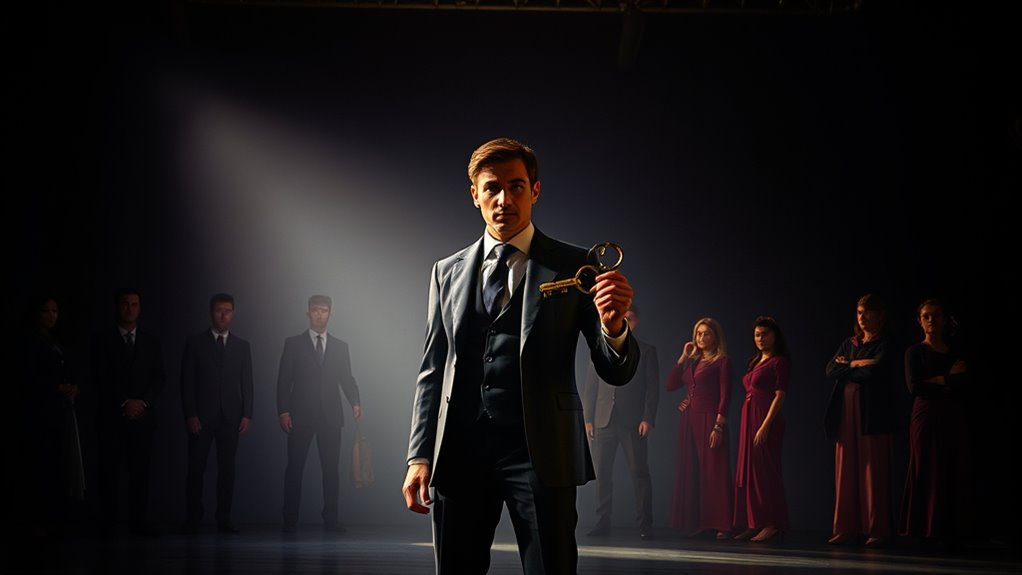To break free from the typecasting trap, focus on expanding your range by auditioning for diverse roles across genres and character types. Work with coaches and seek out projects that challenge stereotypes, even if smaller or less glamorous. Build relationships with industry insiders who value originality and versatility. Embrace growth, push boundaries, and showcase your emotional depth. If you’re ready to learn more strategies for transforming your career, stay tuned for tips to redefine your acting path.
Key Takeaways
- Actively seek diverse roles in different genres to showcase versatility and challenge stereotypes.
- Collaborate with industry professionals on projects that emphasize complex, authentic characters.
- Invest in ongoing acting training focused on character development and emotional depth.
- Build a varied portfolio and network to access unconventional roles beyond typecast parts.
- Persist through rejection, continually push boundaries, and create opportunities to redefine your acting identity.

Many actors and performers find themselves caught in the typecasting trap, where they’re repeatedly cast in similar roles based on their previous work. This cycle can feel like a prison, limiting your opportunities and stifling your growth as an artist. The industry tends to rely on stereotypes—whether it’s the tough cop, the bubbly best friend, or the mysterious outsider—which makes it easier for casting directors to slot you into familiar categories. But breaking free isn’t impossible. It begins with understanding the importance of character development. When you focus on expanding your skills and exploring diverse roles, you demonstrate your versatility. This isn’t just about taking on different characters; it’s about immersing yourself in their backgrounds, motivations, and emotional arcs to create authentic, layered performances. By doing so, you challenge the stereotypes that may have pigeonholed you and show casting directors that you’re capable of more complex, nuanced work.
Overcoming the cycle of typecasting requires embracing diverse roles, deep character development, and persistent growth as an artist.
To escape the industry stereotypes, you need to be proactive. Seek out roles that push you outside your comfort zone, even if they’re smaller or less glamorous. Audition for projects that showcase different genres or character types. If you’re known as the “funny sidekick,” don’t shy away from dramatic roles or characters with darker, more serious traits. The more you diversify your portfolio, the more you break the mold of the familiar persona. Additionally, consider working with acting coaches or taking workshops that emphasize character development. These tools can help you understand how to craft characters with depth and authenticity, making it easier to portray roles that defy stereotypes.
Building your acting range through diverse experiences can also highlight your adaptability to casting directors and help you stand out in auditions. Networking also plays an essential role in breaking the pattern. Building relationships with directors, writers, and producers who value originality and range can open doors to unconventional projects. Never underestimate the power of your own curiosity—sometimes, the best way to shake up your career is to create your own opportunities. Write or collaborate on scripts that challenge stereotypes or depict characters with complex backgrounds. This proactive approach not only broadens your experience but also signals to industry insiders that you’re committed to growth and variety.
Ultimately, overcoming the typecasting trap requires persistence, a willingness to evolve, and a strategic approach to character development. The industry may lean on stereotypes because they’re easy, but your goal is to show that you’re more than just a one-note performer. By pushing boundaries, exploring different roles, and cultivating authenticity, you take control of your career and forge a path that’s uniquely yours. Breaking free from the cycle isn’t overnight work, but with dedication, you can redefine your identity as an actor and inspire others to do the same.
Frequently Asked Questions
How Can New Actors Avoid Early Typecasting?
To avoid early typecasting, you should focus on honing your audition techniques to showcase your full range of skills. Seek diverse roles that challenge you and help build a versatile portfolio. Be open to different genres and characters, demonstrating your adaptability. Networking with industry professionals can also open doors to varied opportunities. This proactive approach guarantees you stand out and develop a broad acting repertoire, reducing the risk of being typecast early in your career.
What Are the Risks of Breaking a Typecast?
Breaking a typecast can be risky for your career, as casting directors might doubt your versatility, limiting future roles. You also face emotional tolls, such as fear of rejection or failure, which can be overwhelming. Taking this step requires courage and resilience, but if successful, it can open new opportunities and showcase your range. Be prepared for potential setbacks, but stay focused on your long-term goals.
Which Actors Successfully Broke Free From Typecasting?
You might wonder which actors successfully broke free from typecasting. They often achieve this through career reinventions and embracing genre versatility. For instance, actors like Charlize Theron and Johnny Depp took on diverse roles, shifting their images. By challenging expectations and exploring different genres, they prove it’s possible to escape typecasting. Their journeys show that with determination and strategic choices, you can reinvent your career and showcase your full range of talent.
How Does Typecasting Impact an Actor’s Career Longevity?
Typecasting can limit your career longevity by making you seem one-dimensional, which hampers your career resilience. When you’re stuck in a specific role, casting directors might overlook your versatility. To break free, you should focus on skill diversification, showing your range in different genres or characters. This adaptability helps you stay relevant and opens more opportunities, ensuring your long-term success in the industry.
Are There Specific Genres More Prone to Typecasting?
You might think certain genres aren’t prone to stereotypes, but genre stereotypes often shape audience expectations deeply. Action and romantic genres, for example, can trap you with predictable roles, making it tough to break free. These stereotypes can limit your opportunities and pigeonhole you into a specific image. Recognizing this allows you to choose diverse projects, challenge audience expectations, and ultimately, broaden your career horizons beyond genre boundaries.
Conclusion
So, don’t let typecasting hold you back. Visualize yourself stepping out of that familiar role, like shedding an old coat for something new. It might feel risky, but imagine the thrill of breaking free, discovering fresh opportunities, and redefining your career. Remember, you hold the power to rewrite your story—each new role is a chance to surprise yourself and those watching. Embrace the challenge; your breakthrough could be just one bold move away.










